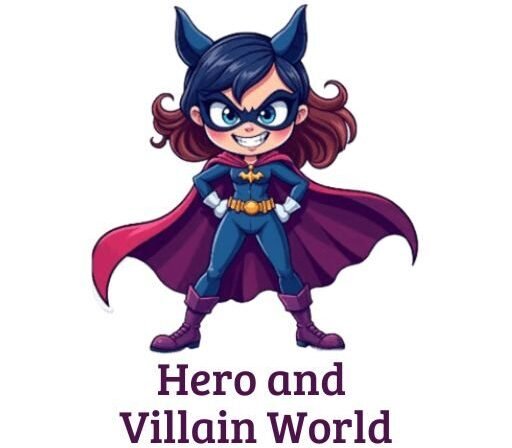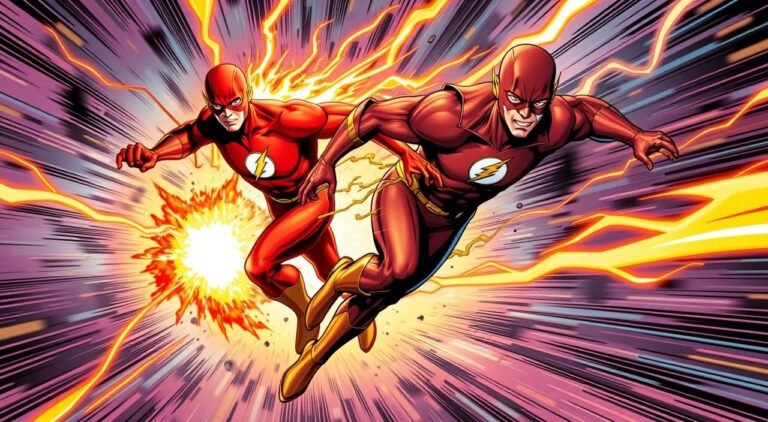Is Vigilantism Ever Justified? What Comics Say About Justice
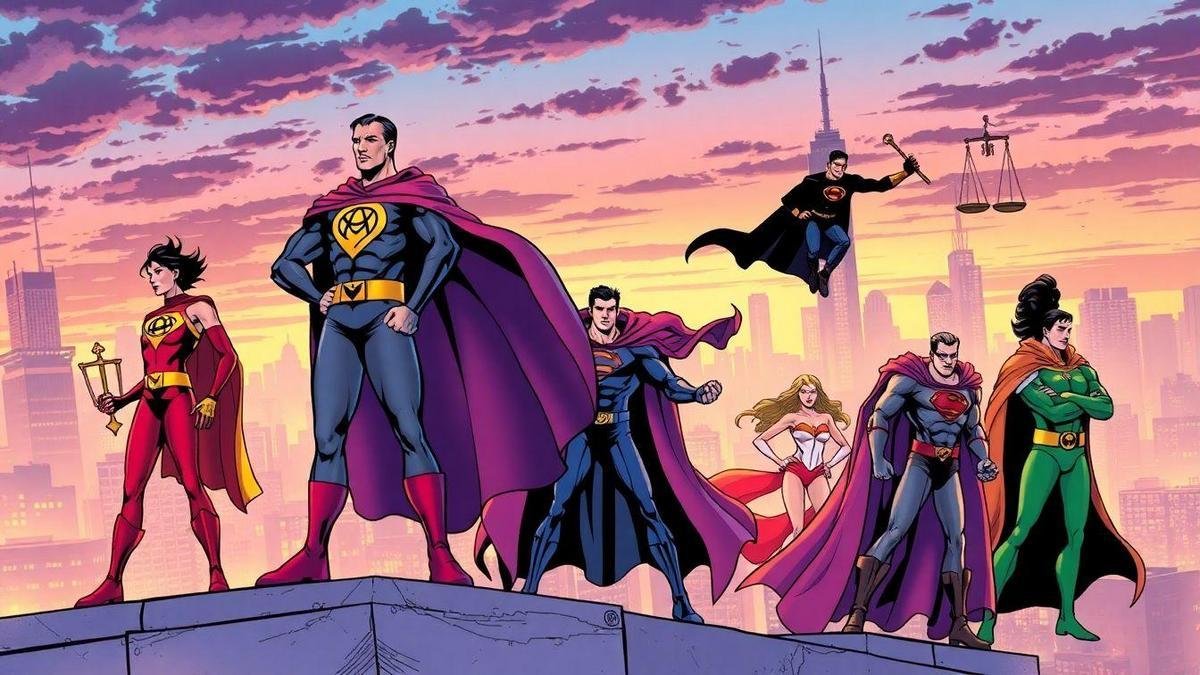
Discover the fascinating world of philosophy, vigilantism, and comics heroes. This article dives deep into what it means to be a vigilante in the realm of comics. You’ll explore who these heroes are and how they face tough moral dilemmas.
Get ready to uncover the balance between justice and ethics as we examine the complex choices that shape their lives and tales. With real-world impacts and questions around what it means to be a hero, you’re in for an exciting journey!
Key Points to Remember
- Vigilantes are often heroes who act outside the law.
- They fight crime when the system fails.
- Comics show the struggle between good and evil.
- Heroes have strong morals and personal reasons.
- Readers connect with the journey of these heroes.
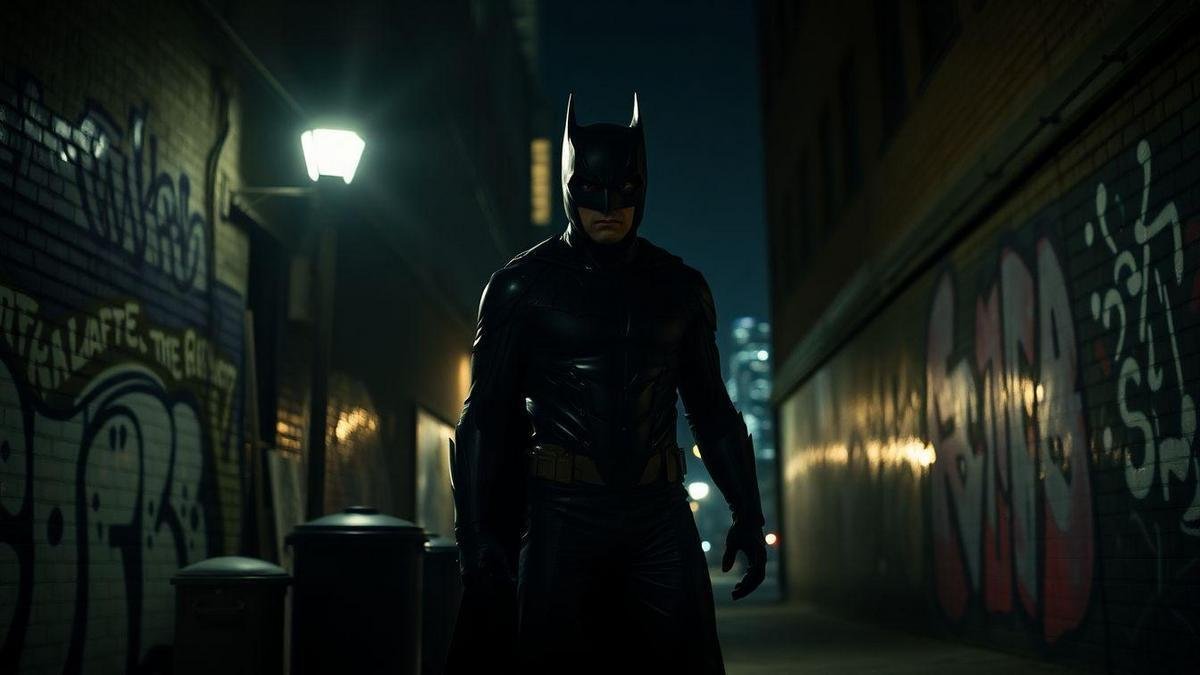
Understanding the Philosophy of Vigilantism in Comics
What is Vigilantism in Comics?
Vigilantism in comics is when ordinary people take the law into their own hands. They don’t wait for the police or government to act. Instead, they step in to fight crime and protect their communities. Think of characters like Batman or The Punisher.
They embody this idea. They believe that sometimes, the system fails, and someone must take action.
The Role of Heroes in Vigilante Stories
In vigilante stories, heroes play a crucial role. They often have personal reasons for becoming vigilantes. Maybe they lost someone to crime or witnessed injustice. Here are a few key points about these heroes:
- Moral Compass: They follow their own sense of right and wrong.
- Flawed Characters: They often have personal struggles, making them relatable.
- Complex Decisions: They face tough choices and must deal with the consequences.
Exploring the Definition of Vigilantism
Vigilantism can be defined as:
| Aspect | Description |
|---|---|
| Motivation | Driven by a desire for justice. |
| Methods | Often involves illegal actions. |
| Consequences | Can lead to more violence or chaos. |
In comics, this philosophy challenges the traditional views of justice. It makes you think: is it right to break the law to uphold it? Characters often grapple with this question, making their stories rich and engaging.
The Moral Ethics of Superheroes
How Do Superheroes Make Ethical Choices?
Superheroes often face tough choices that test their moral compass. Imagine being in their shoes, having to decide between saving a friend or stopping a villain.
It’s a real pickle! They rely on their values and beliefs to guide them. Many heroes follow a code, like Batman’s rule against killing. This code helps them navigate the choppy waters of right and wrong.
Some heroes, like Spider-Man, believe in the saying, With great power comes great responsibility. They know their actions can have serious consequences. It’s all about making choices that reflect their core beliefs and the values they stand for.
The Impact of Moral Dilemmas on Heroes
Moral dilemmas can weigh heavily on a superhero’s heart. These situations often lead to self-reflection and growth. For instance, when Superman faces a choice between saving a city or saving Lois Lane, he grapples with the burden of his powers.
Here’s a quick look at how dilemmas affect heroes:
| Hero | Dilemma | Impact on Character |
|---|---|---|
| Batman | Kill the Joker or let him live? | Struggles with his moral code |
| Spider-Man | Save Aunt May or stop a robbery? | Faces guilt and responsibility |
| Iron Man | Sacrifice himself or save the world? | Learns about selflessness |
These choices shape their identities and often lead to deeper understanding of their roles in the world.
Balancing Justice and Ethics in Comics
In comics, the balance between justice and ethics can be tricky. Heroes want to protect people, but they also need to follow their moral guidelines. This balance is what makes their stories so engaging.
For example, the philosophy of vigilantism often comes into play. Heroes like Daredevil operate outside the law, believing they can deliver justice better than the system. But this raises questions: Is it right to take the law into your own hands?
Ultimately, superheroes must find a way to balance their desire for justice with their ethical beliefs. This ongoing struggle keeps readers hooked and sparks discussions about right and wrong.

Justice in Comics: A Deeper Look
How Comics Portray Justice and Injustice
Comics are more than just colorful pages filled with heroes and villains; they offer a window into our understanding of justice and injustice.
Through the stories of characters like Batman and Spider-Man, you can see how they battle not only villains but also the moral dilemmas that come with their powers. These tales often reflect real-world issues, making you think about what justice really means.
For example, when a hero takes the law into their own hands, they may be seen as a vigilante. This raises questions: Is it right to break the law to achieve justice? Comics challenge you to ponder these questions, making you consider the fine line between right and wrong.
The Different Types of Justice in Comic Book Stories
In the world of comics, justice isn’t one-size-fits-all. Here are some types of justice you might encounter:
- Retributive Justice: This is about punishment. Villains face consequences for their actions, often at the hands of heroes.
- Restorative Justice: Some stories focus on healing and making amends. Heroes work to restore balance rather than just punish.
- Social Justice: Comics often highlight issues like inequality and discrimination. Heroes fight not just for themselves but for the greater good.
| Type of Justice | Description | Example Character |
|---|---|---|
| Retributive Justice | Punishment for wrongdoing | Batman |
| Restorative Justice | Healing and making amends | Wonder Woman |
| Social Justice | Fighting against inequality and discrimination | Black Panther |
Understanding Comic Book Justice Through Examples
To truly grasp how comics portray justice, let’s look at some examples:
- Batman: He operates in the shadows, often taking matters into his own hands. His brand of justice is retributive—he believes that criminals must face consequences.
- Spider-Man: He embodies responsibility. His motto, “With great power comes great responsibility,” shows his commitment to restorative justice. He doesn’t just want to punish; he aims to protect and help others.
- Black Panther: He fights for social justice by addressing issues of race and inequality. His storylines often challenge you to think about the struggles faced by marginalized communities.
These examples illustrate the varied approaches to justice in comics. Each character offers a different perspective, allowing you to explore the philosophy of vigilantism and how it shapes their actions.
Vigilante Philosophy and Its Impact on Society
How Vigilante Heroes Reflect Real-World Issues
Vigilante heroes, like Batman or Spider-Man, often mirror the challenges we face in real life. They tackle issues such as crime, injustice, and corruption.
These characters show us that sometimes, the law may not be enough. For instance, when you see Batman fighting against corrupt officials in Gotham, it makes you think about the struggles in your own city.
These heroes often stand up for the voiceless and fight for what is right. They remind us that individuals can make a difference. Just like in real life, where people take a stand against injustice, vigilantes inspire us to be brave and take action.
The Philosophy Behind Choosing Vigilante Justice
The philosophy behind vigilante justice is intriguing. Many heroes believe that the system has failed them. They think that taking matters into their own hands is the only way to bring about change. This thought process can stem from personal experiences or witnessing injustice.
For example, a character like Daredevil, who was blind but still fought for justice, highlights how personal struggles can lead to a desire for vigilantism. This philosophy raises questions about morality and ethics. Is it right to break the law to uphold it?
Here’s a simple table to summarize the key points:
| Vigilante Hero | Reason for Vigilantism | Impact on Society |
|---|---|---|
| Batman | Corruption in Gotham | Inspires hope and action |
| Spider-Man | Personal loss and responsibility | Encourages standing up for others |
| Daredevil | Personal struggles with justice | Challenges moral boundaries |
The Influence of Vigilante Philosophy on Readers
Vigilante philosophy in comics has a strong impact on readers. It makes you think about your own values and beliefs. When you read about a hero facing tough choices, it can make you reflect on what you would do in their shoes.
These stories often inspire readers to take action in their communities. They show that even one person can make a difference. It’s like a ripple effect; when you stand up for what is right, others might follow.
In conclusion, the philosophy of vigilantism in comics not only entertains but also encourages readers to think critically about justice. It challenges you to consider how you would respond to injustice in your own life.
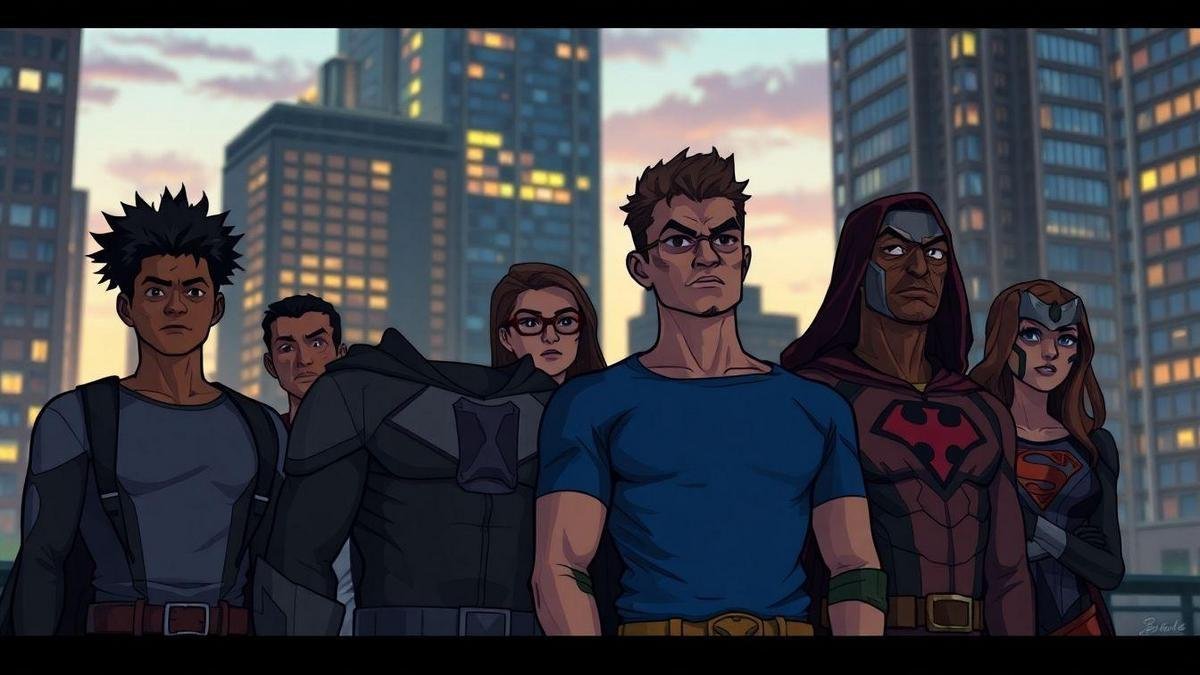
Heroes and Morality: A Complex Relationship
Are All Heroes Morally Good?
When you think about heroes, you might picture someone who always does the right thing. But the truth is, not all heroes are morally good. Some heroes have made choices that can be seen as bad, even if they had good intentions.
For example, consider Deadpool. He often acts for himself, but he sometimes helps others too. This shows us that heroism isn’t black and white. It’s more like a shades of gray situation.
The Gray Areas of Heroism in Comics
In the world of comics, many heroes walk a fine line between right and wrong. They face tough choices that test their morals. Here are some examples of heroes who fit into this gray area:
- Anti-heroes: Characters like Punisher or Venom do bad things for what they believe is a good cause.
- Flawed Heroes: Iron Man often struggles with his decisions, sometimes causing more harm than good.
- Complex Villains: Characters like Magneto fight for what they think is right, even if it means hurting others.
These characters remind us that sometimes, the choices we make aren’t clear-cut. They can teach us valuable lessons about morality and decision-making.
Analyzing the Morality of Popular Comic Book Heroes
To understand how heroes navigate their moral choices, let’s take a closer look at a few popular characters. Here’s a simple table to help break it down:
| Hero | Moral Dilemma | Outcome |
|---|---|---|
| Spider-Man | Should he reveal his identity? | Chooses to protect loved ones |
| Batman | Should he kill the Joker? | Refuses, believes in justice |
| Wonder Woman | Is war ever justified? | Struggles with her choices |
These heroes face tough questions that reflect real-life dilemmas. Just like you, they have to think about what’s right and wrong. Their stories show us that being a hero isn’t just about strength; it’s also about making tough choices and learning from mistakes.
Ethical Dilemmas Faced by Vigilantes
Common Ethical Challenges for Vigilante Heroes
Vigilantes often find themselves walking a fine line between right and wrong. They want to help, but their actions can lead to some tricky situations. Here are a few common challenges they face:
- Justice vs. Revenge: Sometimes, it’s hard to tell if they’re seeking justice or just getting back at someone. This can cloud their judgment.
- Taking the Law into Their Own Hands: They might think they know what’s best, but breaking the law can lead to more problems.
- Collateral Damage: When a vigilante fights crime, innocent people can get hurt. This can weigh heavily on their conscience.
- Moral Ambiguity: What’s right for one person might not be right for another. This makes their decisions even harder.
How Do Vigilantes Resolve Their Dilemmas?
Vigilantes often have to make tough choices. Here’s how they tackle these dilemmas:
- Self-Reflection: They think about their actions and the impact on others. This helps them understand their motives better.
- Consulting Allies: Sometimes, they turn to friends or fellow heroes for advice. A second opinion can help clear the fog.
- Setting Boundaries: Many vigilantes create rules for themselves to follow. This helps keep them on the right path.
- Learning from Mistakes: They often learn from their past actions. If something went wrong, they try to do better next time.
The Consequences of Ethical Decisions in Comics
The choices vigilantes make can have big impacts on their lives and the lives of others. Here’s a look at some possible outcomes:
| Decision Type | Possible Consequences |
|---|---|
| Seeking Revenge | Can lead to a cycle of violence and more enemies. |
| Ignoring the Law | Might result in arrest or loss of public support. |
| Protecting Innocents | Can build trust but may put them in danger. |
| Following a Code | Helps maintain a clear moral compass but can limit action. |
Vigilantes must weigh their decisions carefully. The philosophy of vigilantism in comics heroes often revolves around these dilemmas. They strive to do good, but the path isn’t always clear.
Conclusion
In the fascinating world of comics, you’ve journeyed through the intricate landscape of vigilantism, where heroes grapple with moral dilemmas and the balance of justice. These stories aren’t just entertainment; they serve as a reflection of our own lives and the choices we face.
You’ve seen how characters like Batman and Spider-Man embody the struggle between right and wrong, reminding us that heroism often lies in the gray areas of morality.
As you ponder these complex narratives, consider how they inspire you to think critically about justice and responsibility in your own life. The philosophy of vigilantism challenges you to ask: When is it right to take matters into your own hands? It’s a question worth exploring, and the answers can lead to profound insights.
So, if you’re eager to dive deeper into the world of heroes and the ethical dilemmas they face, don’t hesitate to check out more articles at Hero and Villain World. Happy reading!
Frequently asked questions
What is philosophy vigilantism in comics?
Philosophy vigilantism in comics means exploring the ideas behind superheroes taking the law into their own hands. It looks at what’s right, what’s wrong, and why heroes choose to fight crime outside the law.
Are there famous comic heroes who represent philosophy vigilantism?
Far far away, behind the word mountains, far from the countries Vokalia and Consonantia, there live the blind texts. Separated they live in Bookmarksgrove right at the coast of the Semantics, a large language ocean.
How does philosophy influence comic book stories?
Philosophy shapes characters’ decisions and actions. It adds depth to heroes and their challenges. You get to think about right and wrong as they face tough choices.
Can philosophy vigilantism in comics teach us real-life lessons?
Definitely! These stories often help you think about morality, justice, and responsibility. You may find inspiration for your own actions in the real world.
What themes are common in philosophy vigilantism comics?
Common themes include justice, morality, power, and the human condition. Heroes struggle with the consequences of their actions, showing how complex choices really are.
